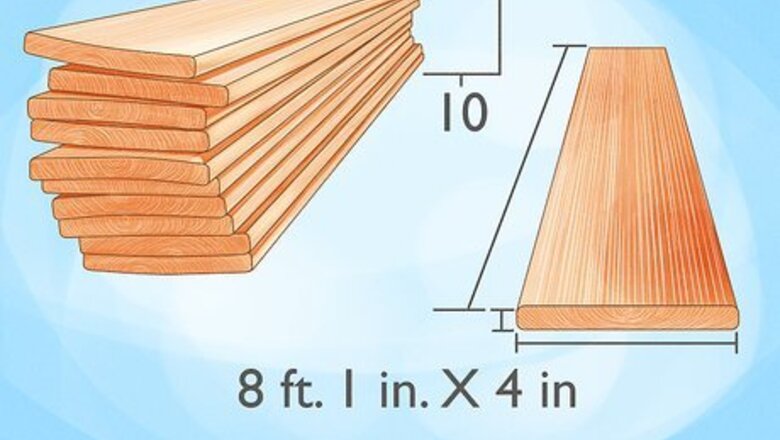
views
Constructing a Raised Garden Bed with Legs
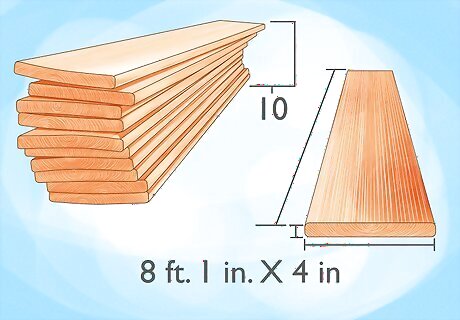
Purchase cedar wood planks. To construct a durable raised bed that is resistant to rot, use cedar wood planks. For this guide, purchase ten 8 ft. 1 in. by 4 in. cedar wood planks and four 8 ft. 2 in. by 4 in. cedar wood planks. If you'd rather purchase cedar wood planks in person, visit a home improvement store like Lowe's or Home Depot.
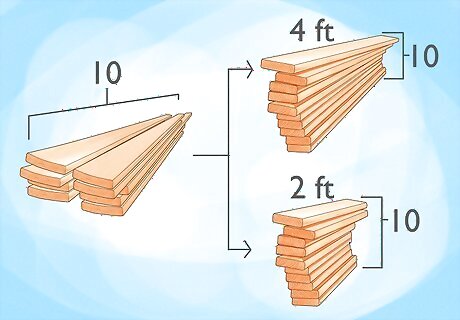
Cut your cedar wood planks using a saw or other wood cutting tool. First, cut the 8 ft. 1 in. by 4 in. cedar planks so that you have ten 4 ft. long side planks and ten 2 ft. short side planks. Then, cut four 30 in. legs from the four 8 ft. 2 in. by 4 in. planks. If you don't have a saw or other cutting tool, ask for your cedar planks to be cut by a professional at a home improvement store. After making these cuts, save the remaining cedar wood to use as your support pieces and bottom slats.
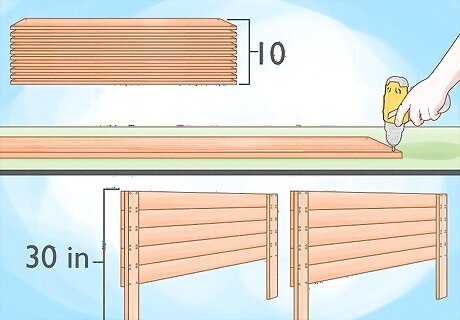
Secure the short sides to the legs. First, drill 2 holes into each end of one of your 2 ft. planks (4 holes in total). Repeat the process so that all ten of your 2 ft. planks have 2 holes on each end. Then, attach five planks in an even row to one of the 30 in. legs with screws. After, attach the other side of these five planks to the opposite leg with screws. Repeat this step for the other five planks so that you have the two short sides of your garden box completed.
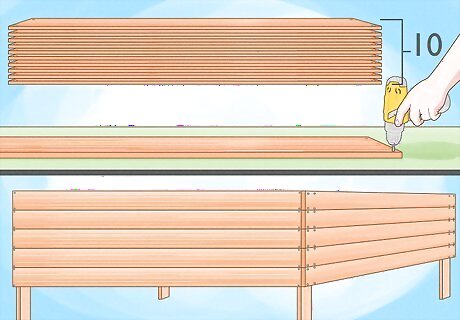
Fasten the long sides to the legs. Drill 2 holes on each end of one of your ten 4 ft. long side planks (4 holes in total). Repeat the process for all ten of your 4 ft. long side planks. Then, attach five long side planks to the short side by screwing them in place on each end. Repeat the process for the opposite five planks so that your garden box officially has all of its sides securely in place. To make sure the box is straight before securing the long side planks in place, use a speed square.
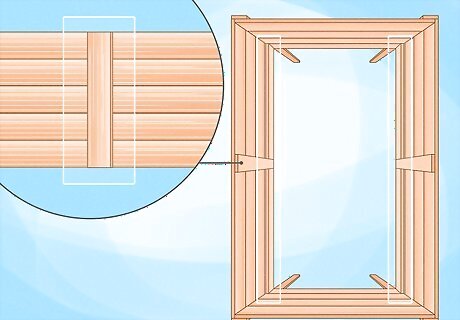
Attach support pieces along the bottom of the garden bed. These will hold up the bottom slats of your garden bed. To construct the bottom support pieces, use your remaining 2 in. by 4 in. planks. Using wood glue, place these supports in an even line along the long and short sides of the garden box. Since your bottom slats will rest on the support pieces, place them right below where you would like the bottom of your garden bed to be.
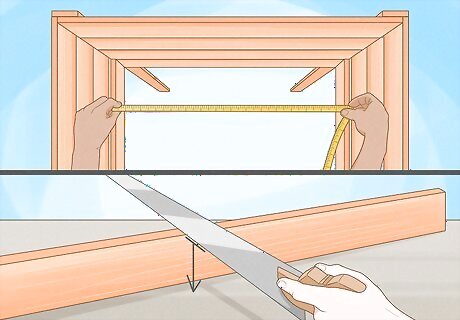
Cut identical wooden slats to line the bottom of the box. To construct the bottom of your garden box, measure the length between the two long sides of your garden box. Then, cut your remaining cedar plank scraps to that size.
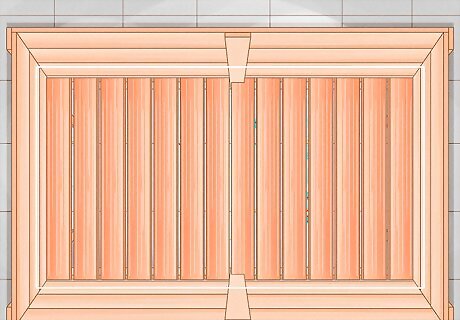
Attach each slat to the supports along the bottom with a nail gun. First, place the slats over the supports on the bottom of the box. Leave a slight gap between each slat so that the soil in your garden bed can drain. Then, attach either side of each slat to the supports underneath with a nail gun.
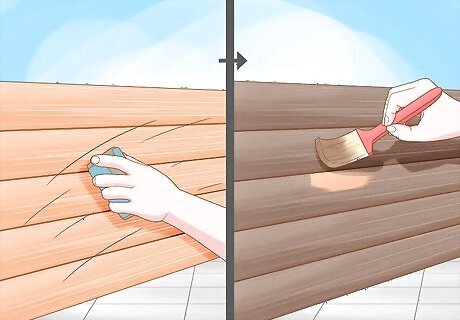
Stain or paint the planter if you would like. Staining or painting can add more personality to your garden bed. To paint or stain your garden bed, first sand down the surface with 120-grit sandpaper. Then, wipe down the surface with a clean cloth. If you're staining the wood, apply the stain and let it sit for 5-10 minutes (the longer you wait, the darker your stain will be). Then, wipe off the stain. If you're painting, apply a layer of paint, then wait for it to dry. If you plan on eating the veggies in your garden, go for a non-toxic, water-based polyurethane stain. For paint, choose exterior acrylic paint to be extra safe. After the stain or paint dries, consider adding a second coat.
Prepping the Garden Bed for Planting
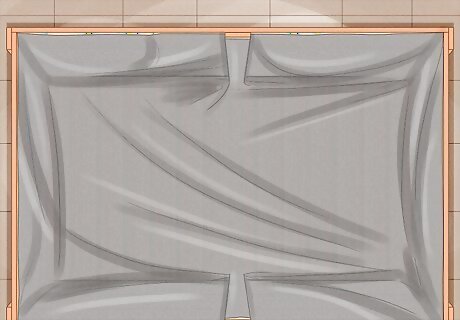
Lay out landscape fabric over the bottom. Landscape fabric is a perforated fabric that protects the wooden slats of your garden bed while also allowing the soil to drain. To make your raised garden bed last as long as possible, line the bottom of the box with the landscape fabric before adding your soil.
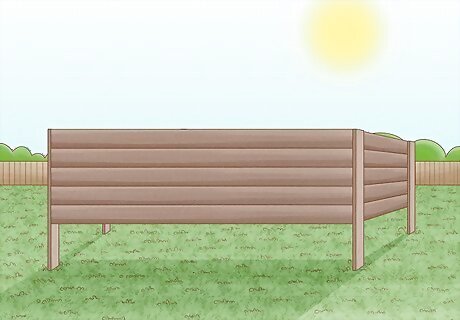
Place your garden bed in an even location with lots of sunlight. Many vegetables and flowers need at least 6 to 8 hours of sunlight a day (A.K.A. full sunlight). To ensure that your plants get all the sunlight they need, place your raised garden bed in an area with access to direct sunlight. To ensure that your garden bed is secure, place it on an even, level surface in your yard or on your porch.
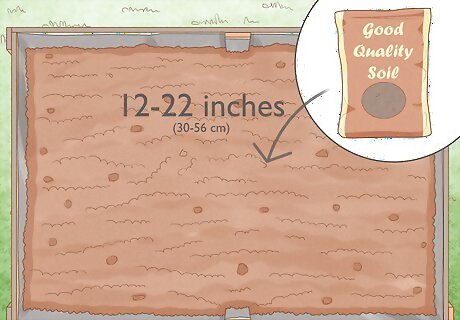
Add 12–22 inches (30–56 cm) of good-quality soil. In general, plants need about 12–22 inches (30–56 cm) of soil to thrive. If you're planting vegetables in your raised garden bed, fill your raised garden bed with 18–22 inches (46–56 cm) of soil. This will be plenty of soil to allow the roots to grow strong. To give your plants all the nutrients they need, consider adding a layer of compost over the soil.
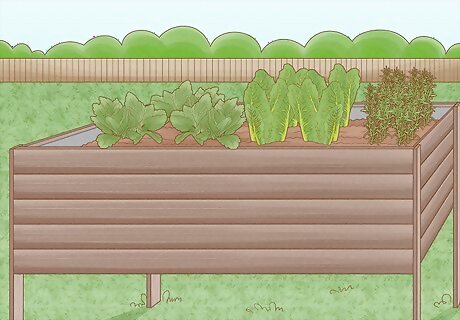
Plant the flowers, vegetables, and herbs of your choice. Grow plants and vegetables like radishes, tomatoes, and leafy greens. If you're interested in planting flowers, try poppies, nasturtium, or marigolds. Though you can fit many varieties of vegetables, flowers, and herbs in your garden bed, leave some space in between each seed so that each has enough room to grow. To ensure a thriving garden in the spring and summer, try planting after the last frost. If you'd like to plant flowers in the fall or winter, try planting Hellebore.















Comments
0 comment